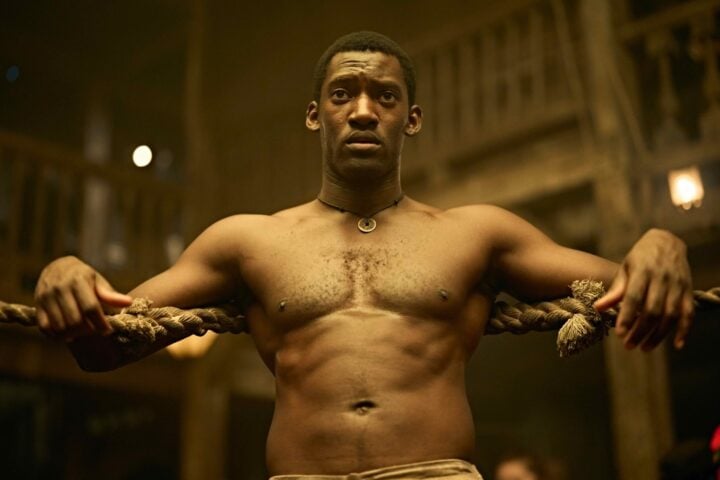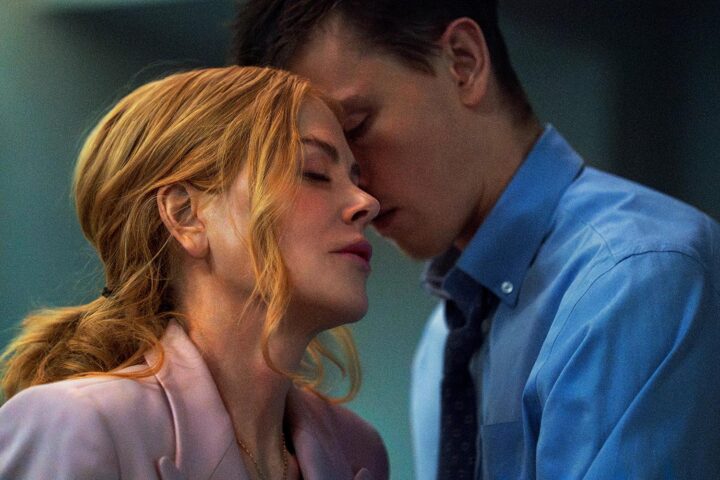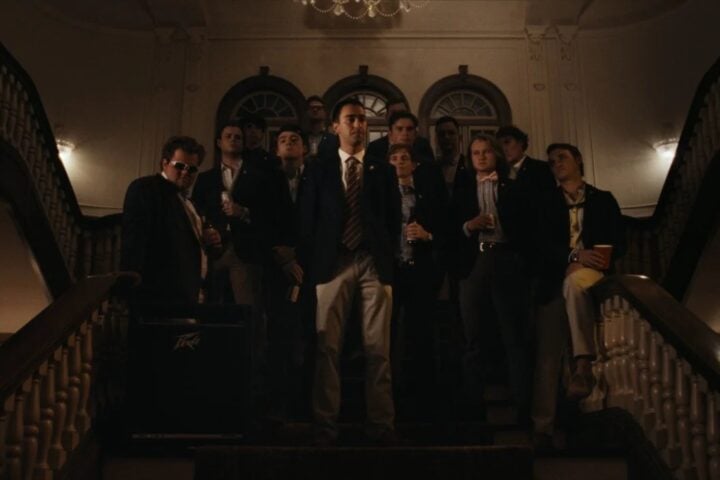Steve McQueen’s film work has never exhibited much of an interest in moral complexity or psychological nuance, usually conveying themes such as the institutionalized horror of chattel slavery (12 Years a Slave) or the principled self-negation of Irish republican resistance (Hunger) in easily understood terms. It makes sense, then, that his latest tale of another dark period in recent history is told primarily from the perspective of a child.
Blitz follows George (Elliott Hefferman), a young boy evacuated from London during the heavy German bombing raids of the city that began in September 1940. Bailing early from a train carrying him and hundreds of other children to the relative safety of rural villages, he hops on another heading back to the city, hoping to return to his mother, Rita (Saoirse Ronan), and grandfather, Gerald (Paul Weller), in their increasingly devastated East End neighborhood.
McQueen’s choice to recreate this particular era is perhaps a surprising one. A Black British visual artist and filmmaker with a critical, if not entirely iconoclastic, outlook, his staging of a tribute to his countrymen’s oft-elegized “Blitz spirit” resilience during World War II seems like a left turn, particularly in the wake of his Small Axe anthology’s significantly more urgent excavations of untold and deliberately overlooked events from England’s past.
Fears that McQueen might be embracing a more rose-tinted approach are temporarily allayed by Blitz’s impressive opening sequence, which might be the most striking of the filmmaker’s career to date. Following a silent close-up of a bomb in freefall and its subsequent explosion, a group of firefighters extinguishing the resulting blaze lose control of their hose in the thick smoke and it’s shown spiraling violently around the frame, until the high-pressure water jets are visually deconstructed into a mosaic of white lines against a black background.
A slight departure from the controlled minimalism with which McQueen tends to begin his films, this set piece briefly brings to mind David Lynch’s celebrated visualization of an atom bomb test in Twin Peaks: The Return. Unfortunately, its dynamic abstraction soon gives way to less vital images of midcentury working-class life that expose some of the director’s limitations.
Even more so than in his enjoyable yet unbalanced Widows, McQueen’s keen painterly eye and impressive showmanship consistently run counter to any ethical agenda. Whether depicting impromptu piano sing-alongs in George’s home or cheeky female camaraderie in the munitions factory where Rita works, the immaculate framing and lighting can’t help but enhance the film’s burned-in nostalgic glaze and exacerbate the two-dimensionality of the characters, which dulls the emotional impact of the traumas to which they’re subjected.
Audiences with a thirst for images of flattened urban architecture, shell-shocked civilians, and outpourings of grief certainly have no shortage of those in 2024, and it’s difficult to say how deeply McQueen ponders how his fictional work fits into this broader sociopolitical landscape. Not that this should ever be an obligation, despite his clear commitment to representation as a practice and his effective branding for progressive middle-brow film culture as both an emissary from the more rarefied visual art world and a steadfast chronicler of the Black experience. It’s also worth asking what higher purpose his aesthetic grandeur could possibly serve, when even the most low-res smartphone video from a warzone is now capable of revealing previously unimaginable degradations. However, it’s hard not to sense a kind of resignation in the tethering of his regularly sublime aesthetic to such facile sentimentality.
This romanticization of the milieu also extends to its more deep-rooted injustices. George’s father, Marcus (CJ Beckford), is a Grenadan immigrant who was arrested and deported following an altercation with a hostile group of white men on a night out with Rita, and the young boy’s biracial identity makes him the target of scorn and mistrust from adults and fellow children alike. He eventually meets a pure-hearted Nigerian soldier, Ife (Benjamin Clémentine), who teaches him to embrace his Black identity before also successfully preaching tolerance to men who are attempting to segregate a makeshift air raid shelter.
Though its focus on George’s experiences is an admirable correction of the historical record, the film’s oversimplification of the era’s overt prejudices makes racism more of a textural element, as opposed to something to be seriously reckoned with. There’s also a suggestion that the more significant form of discrimination is by authority figures against the economic underclass, represented most vividly through the police and transport officials’ reluctance to let locals take shelter in the underground stations overnight. But this is also only hinted at in passing, before the film returns to its parade of stock figures and gently unceasing forward motion.
Nevertheless, if viewed primarily as a populist fable, Blitz isn’t without potency. And its most memorable departure from realism comes late on, when McQueen’s urban picaresque leads George to a small-time criminal gang that seems to be a holdover from Dickens’s London. Led by the Fagin-like Albert (Stephen Graham) and Beryl (British comedy stalwart Kathy Burke, the cast member who seems to most clearly grasp the broad register in which Blitz is mostly operating), they profit from the carnage visited nightly upon the city by robbing its abandoned buildings. One of the gang’s after-hours excursions sees them pocketing jewelry and wallets from the deceased occupants of a glamorous ballroom, often posing and holding mock conversations with these revelers, whose joyous partying was shown in a preceding scene.
This macabre sequence is evocative not only for its sly gesturing at a kind of liberatory wealth redistribution in the ruins, but also partly because of how closely it mirrors McQueen’s approach with this film: reanimating the corpses of a war-torn populace for the purposes of entertainment, or even grim fascination. Blitz is an earnest, broad-strokes portrait of a bustling city that occasionally succeeds in communicating the unprecedented sensory shock of modern warfare, but its uncritical craftsmanship and quarantining of past atrocities from present-day concerns also render the proceedings mostly lifeless.
Since 2001, we've brought you uncompromising, candid takes on the world of film, music, television, video games, theater, and more. Independently owned and operated publications like Slant have been hit hard in recent years, but we’re committed to keeping our content free and accessible—meaning no paywalls or fees.
If you like what we do, please consider subscribing to our Patreon or making a donation.







Excellent review!